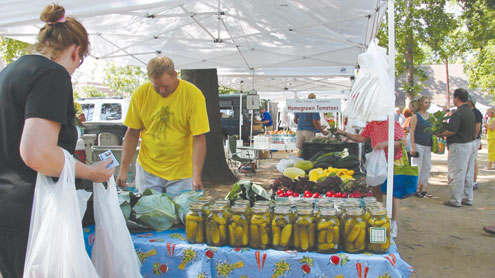 The lawn of Canterbury Episcopal Chapel on the corner of Hackberry Road and University Boulevard will be full of vendors offering fruits, vegetables, cakes, bread, pork, beef and many other goods this Thursday starting at 3 p.m.
The lawn of Canterbury Episcopal Chapel on the corner of Hackberry Road and University Boulevard will be full of vendors offering fruits, vegetables, cakes, bread, pork, beef and many other goods this Thursday starting at 3 p.m.
Homegrown Alabama began five years ago as a project of students in the College of Human Environmental Sciences.
The first few markets were not intended to continue past the class project, but because of good turnouts by students, faculty and members of the community, Homegrown Alabama expanded into a yearly farmers market, said Andrea Mabry, assistant market manager and a graduate student at the University.
Lindsay Turner, market manager and president of the Homegrown Alabama student group, said the market is a great asset to the community because it increases access and availability of local fruits and vegetables to the University and the community.
“It is just a fun community event,” she said. “Even if you don’t need produce, you are still welcome to come sit with us, listen to live music and drink tea.”
In addition to live music, the market will also feature activities for children such as face painting.
“I’m really excited because Homegrown Alabama is proving itself as an established farmer’s market,” Mabry said. “Now we are at the point where a lot of people are coming to us and asking if they can participate.”
This season, Homegrown Alabama has 25 to 28 vendors that offer a variety of goods, Mabry said. However, not all of those vendors will be at every market — there will be about 12 vendors at a single market.
Vendor Susan Horn of Mockingbird Farm said Homegrown Alabama has given her access to a wonderful group of customers who want fresh, local produce that can’t be found nearby at such great prices.
Mockingbird Farm specializes in specialty produce, such as salad greens, cooking greens, herbs, sunflower sprouts and a few plants, all of which are grown without chemical pesticides and fertilizers, Horn said.
“We pick, sort, wash and bunch everything by hand, and provide high quality, super-fresh produce, much of which is not available in stores and other markets,” she said.
In addition to accepting Bama Cash, credit and debit cards, Homegrown Alabama will be implementing it’s SNAP/EBT matching program throughout the entire market season. SNAP/EBT recipients who spend $10 or more will receive an additional $5. After the EBT card is swiped, the customer will receive wooden tokens, each with a designated money amount, to spend at the market.
On designated weeks, Homegrown Alabama will match up to $25 spent at the market for SNAP/EBT customers.
Homegrown Alabama also accepts vouchers from individuals who use Canterbury Episcopal Chapel’s food pantry.
“Canterbury gave us a grant that allows us to give out vouchers to people who use their food pantry,” Mabry said.
Using vouchers allows the food pantry patrons to eat healthier foods instead of boxed food that is not as nutritional, she said.
Mabry and Turner encourage everyone to shop at local farmers markets because not only do customers receive fresh produce and not have to pay sales taxes, they also help the local economy by purchasing local food.
“Consumers have a lot of power in where they spend their food dollars,” Mabry said. “Spending your dollars at a farmers market shows that you are aware of how much farmers markets contribute to the local community. You also get a chance to talk to the people that grow your food and ask them questions about how they did it.”









